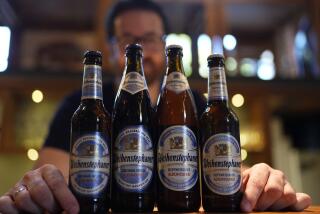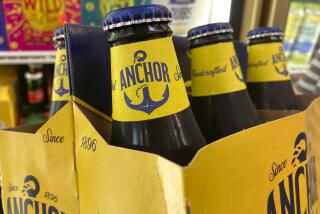Torrance brewery’s cup runneth over during soccer championship.
- Share via
At the Alpine Village Inn restaurant outside Torrance on Wednesday, waiter Hector Gonzalez was furiously filling beer orders for a screaming crowd of soccer fans watching West Germany beat England in the World Cup semifinal on big-screen TV.
The beverage of choice for the pro-German crowd: cold draft from Alpine Village Hofbrau, an adjacent brewery that sells much of its beer to the restaurant.
“The crowds are really big when the Germans are playing,” Gonzalez said, rushing from table to table.
The demand for the locally brewed German-style beer is likely to be booming again today when West Germany meets defending champion Argentina in the World Cup final, said Gonzalez.
“I already have a headache,” he joked.
If the World Cup has been kind to the Alpine Village Inn, it has also smiled on Alpine Village Hofbrau, the South Bay’s only brewery. Located in the Alpine Village complex on Torrance Boulevard, the 2-year-old business is making its mark as one of the nation’s growing number of microbreweries, facilities that brew fewer than 60,000 barrels of beer a year.
About 25% of the local brewery’s 5,000-barrel-a-year production is sold to the Alpine Village Inn restaurant or during the Alpine Village complex’s annual Oktoberfest, which runs from mid-September through October, company executives said.
The balance of the beer is marketed largely in Southern California to customers ranging from the Bonaventure Hotel in downtown Los Angeles to Father’s Office, a small Santa Monica bar that offers 31 varieties of microbrewed beer.
To boost its sales, the brewery is now planning to bottle its beer, which so far has been sold only by the keg. Marketing Manager Martyn Sells and brewery President Jerry Blaskovich, a San Pedro dermatologist, say they expect to have bottling equipment on line by the fall.
Lately, however, the brewery has had to concentrate on a shorter-term goal: quenching the thirst of the West German World Cup team’s local supporters.
“We’ve doubled our sales to the restaurant. This place has really been hopping, if you’ll pardon the pun,” Sells said.
Like other microbreweries, Alpine Village Hofbrau is trying to develop a local and regional clientele by producing beers that, although more expensive, are fresher and of higher quality than those made by larger breweries.
Some do so by developing specialized brews designed to appeal to local beer drinkers. Others, like the Alpine Village Hofbrau, adhere rigorously to time-honored brewing techniques.
“Alpine Village seeks to preserve traditional beer-making,” said Bob Judd, director of the California Small Brewers Assn., a grouping of the state’s microbreweries. “You wouldn’t find it trying to make raspberry beer.”
The investor-owned Alpine Village Hofbrau was opened in July, 1988, under an agreement with the Hofbrauhaus Traunstein, a brewery in Traunstein, West Germany. It is under separate ownership from Alpine Village’s complex of shops and the Alpine Village Inn.
Hofbrauhaus Traunstein provided its beer recipes and technical consulting in return for a percentage of the South Bay brewery’s income, according to Gunther Buerk, part owner of the brewery.
The brewery eschews artificial carbonation or the additives some brewers use for such purposes as coloring, speeding fermentation, enhancing foam or prolonging shelf life.
It observes the Reinheitsgebot, a more than 400-year-old Bavarian purity standard requiring that only barley malt, hops, water and yeast be used to make beer.
Ludwig Erl, a German brew master whom Hofbrauhaus Traunstein recruited for Alpine Village Hofbrau, uses malt from North American-grown barley, German hops, his own yeast culture and a brewing process that takes more than a month.
Local water, he says, has to be purged of chlorine and minerals with an ion-exchanger. And in California the alcohol content of beer has to be kept to 4% or less, lower than in Germany. But the end products--Alpine Village Hofbrau lager, pilsner and light beers--nearly match the taste of their German-brewed brothers.
“It’s a little different than Hofbrauhaus beer, but I think it’s a little better,” Erl said. Apparently, local beer drinkers also like the South Bay-made brews.
“They’re all very popular,” said Victor E. Barone, part owner of the Father’s Office bar. “The Alpine pilsner day in and day out is one of our top three sellers.”
More to Read
Go beyond the scoreboard
Get the latest on L.A.'s teams in the daily Sports Report newsletter.
You may occasionally receive promotional content from the Los Angeles Times.






